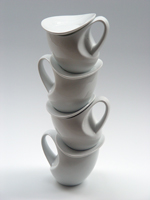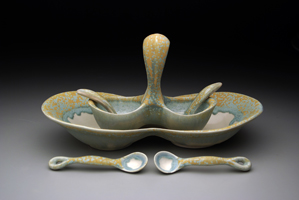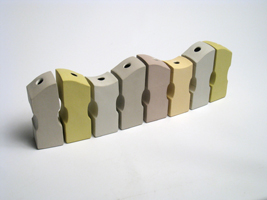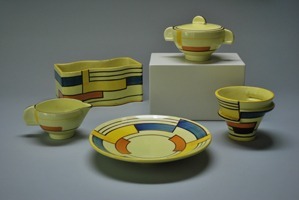
April 23–June 25, 2011
Curated by Karen Crews Hendon
Grand Opening Reception: May 14, 6-9 pm
AMOCA presents Ceramics: Post-Digital Design, on exhibit from April 23 through June 25, 2011. This modish and very chic exhibition places the work of world-famous designer Eva Zeisel (b. 1906) side by side with contemporary ceramic designers David Pier, Heather Mae Erickson, Peter Saenger, Shawn Spangler, Hiroe Hanazono, Mia Mulvey, Karen Swyler, Marek Cecula, Klein Reid, and many others who favor a minimalist aesthetic, producing clean, simplistic forms, organic curves, and orderly compositions that reference nature by design. The emphasis of producing limited-edition multiples through the use of molds yields an expression that relates to the mid-century modern design movement and pays tribute to the Scandinavian architectural model influenced by the Bauhaus style. In Ceramics: Post-digital Design, each artist presents a unique perspective with their own ceramic processes and designs that continues a dialogue examining the future concepts in ceramic art.
As technology is continually advancing, we question: how far we can go? What will the future of industry, commerce and even art be like? New technology brings a multitude of opportunities and ideas, but we wonder if there will be a point where the human footprint will be lost, or if we will return to traditional methods for creating and communicating due to our communal nature. Ostensibly, the future holds a hybridization of all the above; as technology grows, humans evolve, and societal networks change, art is expressed in new powerful ways. The idea of a “Post-Digital Age” is upon us, and many art historians believe therein lies the future of art. Artist and educator Mel Alexenberg, author of The Future of Art in a Post-Digital Age, writes about new emerging art forms that “address the humanization of digital technologies” and explores post-digital perspectives that are “rising from creative encounters among art, science, technology, and human consciousness.”
Although the fundamentals of ceramics are rooted in traditional use, concepts and designs have evolved to keep up with a continually advancing aesthetic. Technology has not only transcended the processes through which ceramics can be made and modified, but it has also transcended the way artists conceptualize their artwork. AMOCA’s exhibition, Ceramics: Post-Digital Design exhibits the very principle of Alexenberg’s thesis, which is that artists, no matter what medium, are making “interactive and collaborative forms, resulting in a fusion of spiritual and technological realms.”




